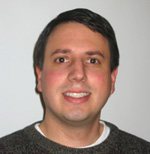
Chris Rector
4th Year graduate student
Wake Forest University, BS Chemistry with honors
How did you become interested in chemistry?
Between my sophomore and junior years of high school, I attended a summer program and received my first introduction to the world of chemistry. Over the next month, my knowledge of the subject increased from being completely na�ve to one of respect and fascination. I took all the available chemistry classes at my high school, and planned on majoring in the subject in college. In college, I had planned to employ my science degree into a career as a physician. I still retained an on-going curiosity with chemistry. During my senior year at Wake Forest, I did undergraduate research under Dr. Ulrich Bierbach studying DNA binding. I had informed him of my desire to attend graduate school in chemistry and expressed some of my concerns about being ready for such a move. He spent a great deal of time teaching and improving my laboratory techniques. By the end of my year in his group, I had gained both confidence in my abilities and a tremendous growth in my understanding of the subject.
How did you decide to make Vanderbilt your graduate school?
During the fall of my senior year, I began sending out for graduate school. Vanderbilt was not even a consideration for me. I attended a regional ACS meeting and met a representative of Vanderbilt at the school fair. I was intrigued, and after reading the information package, I decided to apply. My first visit to Vanderbilt was impressive. I walked into the chemistry building and was awed. As I toured the facilities I was continually impressed by the availability of research instrumentation from the NMRs, to the mass spectrometers, and the other equipment. The openness of the labs in addition to the individual space given to each student was very impressive (considering my previous university visit, which had the students nestled in a cubicle within a lab with no windows). The faculty was the final selling point. I had a sense of ease with them and enjoyed the sense of openness in the department. Communication and collaborations seemed to be encouraged between students and faculty. Upon leaving, I had all but decided as to where I would be attending the next fall.
What is your research specialty?
I work for Ned Porter, the department chairman, whose specialties include organic and bioorganic chemistry. My research focuses on dihydroperoxides from the autoxidation of fatty acids and esters. Our goal is to obtain a greater understanding of their mechanistic pathway and role in oxidative stress.
What is your favorite thing about Vanderbilt?
Today, I cannot imagine myself at any other school but Vanderbilt. The department has given me the opportunity to study and grow as a person in an environment in which I am very comfortable. The encouragement of communication within the department and Vanderbilt community is a cornerstone. Programs such as VICB and VINSE help to further communication and lead towards new advances in research through new collaborations.
In my four years here, I cannot think of a time when I needed an instrument and could not get access to it.
The knowledge that, as a graduate student, you can easily discuss a specific procedure with someone in another field which could save you time in your research is comforting, because you can spend time pressing your research forward instead of overcoming rudimentary mistakes while learning new techniques.
My life at Vanderbilt has not been entirely based in the lab. I have participated in intramural softball on the departmental teams and have suffered no permanent damage. For my first three years, I was involved with the graduate student steering committee. During that time I helped with the organization of our semi-annual departmental picnics and led the planning of two student-organized Warren lectures. The picnics give everyone a chance to get out of the labs for the afternoon and have a good time. The lectures were rewarding because I was able to meet and have dinners with world-renown chemists.
What do you think your first career will be?
Teaching at a small university, probably not one as large as Vanderbilt, either undergraduate research or a small PhD program.
What advice would you give someone going into chemistry?
Carefully consider your options as it is a field that you thoroughly enjoy. Grad school for chemistry requires a lot of work, but if it's something you enjoy, you will master it. It is a big commitment.
My experience during my first year at Vanderbilt overcame my initial concerns about graduate school. In addition to my academic concerns, I was also apprehensive of learning my way around a new city as well as establishing a new network of friends. My first week of orientation helped me realize that I was one of 20 people with the same issues.
By the end of orientation, we were familiar with one another and ready for the first year of classes. Friendships developed during those first two weeks were instrumental as we formed a support system that not only helped us through that first year but are also still present as we approach our final defenses.